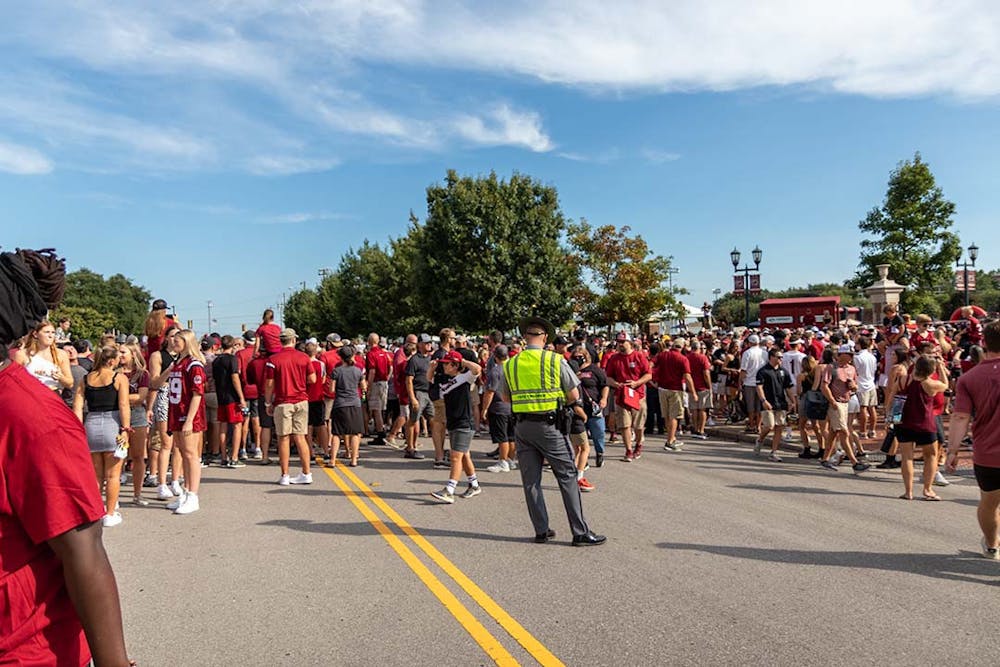Many Gamecock fans are familiar with the congested traffic that surrounds Williams-Brice Stadium on game day, but people may not be aware of the complex process that keeps cars and people flowing — even if it is slowly.
Scott Benson, a fourth-year political science student, has lived at Stadium Suites since January 2022. He said his first football season at the apartment complex has been "frustrating."
“A lot of people do live on Bluff (Road)," Benson said. "So on game days, when the road closes or it’s one-way (traffic), it’s super inconvenient. It’s almost impossible to get back in.”
Bluff Road is the four-lane road that runs on the Southwest side of the stadium and is home to a Bojangles and Waffle House. It is narrowed to a one-way road during football games.
Benson said he remembers during one game day his roommate got off of work around 11 p.m. and was unable to make it home for almost three hours because of the congestion.
However, traffic does not just affect those who live at Stadium Suites. It affects everyone who lives around the stadium.
“It’s really frustrating,” said Emory Farrand, a USC alumni and a resident at Redpoint Columbia. “If there’s a game going on, it kind of makes me have to add two extra hours on my plans where I have to drive somewhere and get stuck in traffic, take back roads to go around it."
Farrand said it took him at least an hour and a half to get home from work during a game night last year. Bluff Road was blocked off, so he had to take an alternate route through the city to get home. He also said police were directing traffic and setting up road closures in the opposite direction of where he needed to go.
The South Carolina Highway Patrol is responsible for directing the flow of fans into and out of Williams-Brice Stadium on game days. Their main focus is on the traffic, and there are as many as 100 troopers that come from all over the state to direct traffic, according to David Jones, a community relations officer for the S.C. Highway Patrol.
Jones said officers meet five hours prior to kickoff to go over the concerns of the day. Then, officers get on the road to help with traffic direction, which means possibly shutting down lanes to allow for incoming car and foot traffic.
“It’s important to keep that traffic flowing, but it’s also important to get the fans to the game,” Jones said. “Whenever you have pedestrians crossing the road, that traffic tends to stop and although it may stop on George Rogers Blvd., that may affect traffic three miles away in the city of Columbia.”
Traffic congestion is caused by limited parking, unexpected pedestrian crossings and trains running on schedule, according to Jones. The roads are also not designed to contain hundreds of thousands of people at once for hours on game day.
“Anytime you go to an event where 100,000-plus people show up, you should come to expect that there’s going to be some sort of traffic delay,” Jones said.
One thing that students can do to avoid waiting in traffic on game day is to take the shuttle to and from the game.
“We are working, not for this season but for next season, possibly doing a dedicated bus lane on Assembly Street. The issue with that this year was highway patrol just didn’t have the manpower for it, but the university and highway patrol was receptive to it,” said Blake Gibbons, the Student Government division secretary of campus wellness. “We could possibly see a bus line that’s just so good for (students) and have a lot faster access to the stadium.”
A special shuttle lane dedicated to busing students from campus would help speed traffic up, but those like Benson and Farrand who live around the stadium, also desire a dedicated lane to be able to bypass traffic and get home.
Gibbons said Richland County is also considering installing sidewalks along Assembly Street that will connect the stadium to Blossom Street.
“Safety is the number one priority,” Gibbons said. “Whether you’re driving, whether you’re walking, whether you’re biking or taking the bus, we want you to be safe. We want you to have a fun time.”
His office is also working on installing phone chargers in the upper and lower decks for when students' phones die and they need to call a ride.
While these measures and solutions will not go into effect this season, Gibbons said Student Government is always looking for solutions.
“Game day is a very complicated logistics process," Gibbons said. "Even though we're kind of on the tail end of the football season this year, I wouldn't be surprised if we had some changes next year to increase safety and efficiency for all.”

